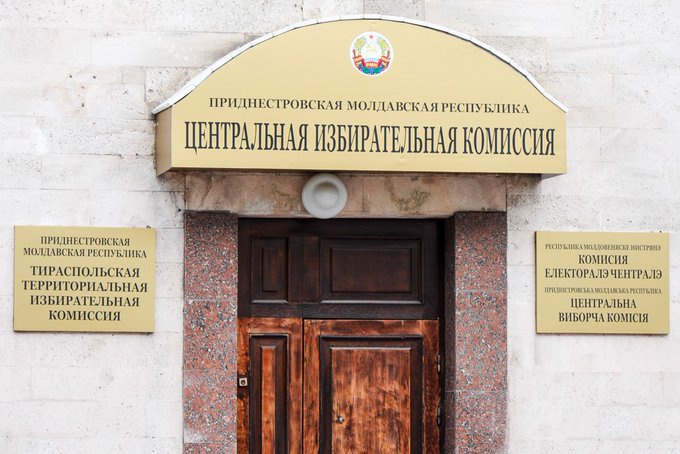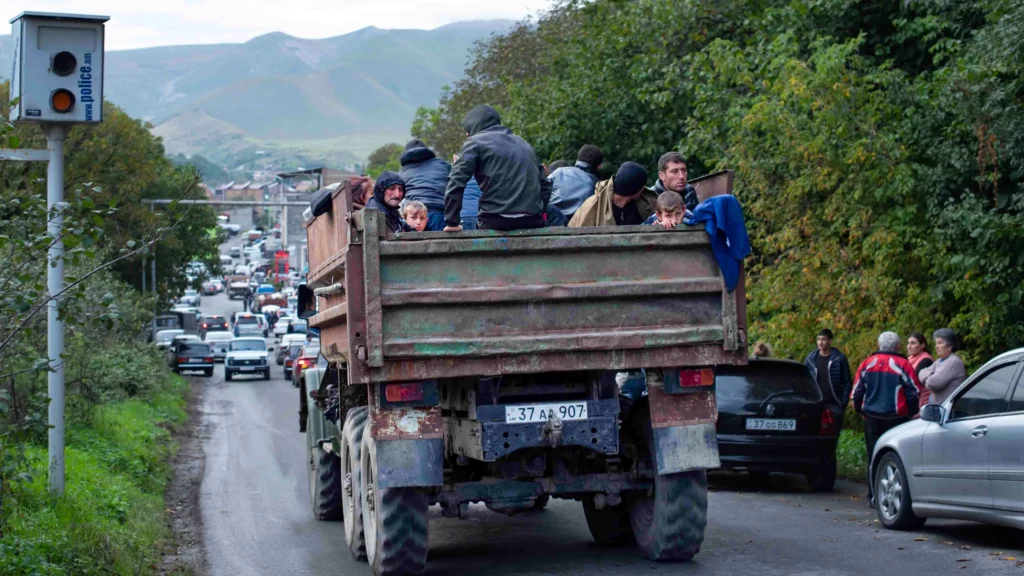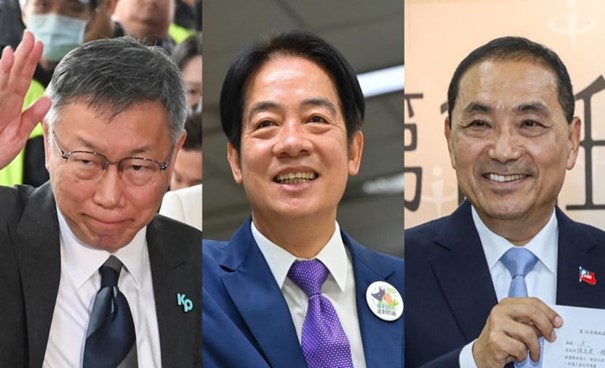Transnistrian Presidential Elections 2021: Democratic Legitimacy Strangled by the Oligarchy
Prelude
On December 12th, Transnistrian citizens are invited to the polls to elect their next president. If last year’s parliamentary elections are any precursor, then we’re in for no surprises. Sheriff, the break-away region’s largest company, has consolidated all power. The Supreme Council, Transnistria’s parliament, shrunk in last year’s election and now only has 33 seats. Last year, 29 of those seats were won by Sheriff’s political arm, the political party “Obnovlenie”, or renewal in English. The other four seats were won by independent candidates, all with their own ties to the company.
The country had record low voter turn-out, less than 28% of Transnistrian voters went to the polls. Due to the fact that 23 of 33 voting districts had candidates running unopposed, one might assume that there’s a lack of people willing to run. The political researcher from Tiraspol and former Obnovlenie representative, Anatoliy Dirun, would disagree: after the parliamentary elections, he told Kommersant that some candidates are advised not to run at all, others run into bureaucratic problems at the election commission, such as himself in 2020.
Although the region has never been considered a shining light of freedom and democracy, past elections at least seemed freer and fairer. In 2011, following continually decreasing support of the separatists’ long-time first president, Igor Smirnov, the independent candidate Yevgeniy Shevchuk won the election. Five years later, Shevchuk, amidst mounting public disapproval, lost the election to Vadim Krasnoselskiy, who is now running for his second term. To win his first election, Krasnoselskiy ran against 6 other candidates, but in this year’s election only one other candidate has been registered.
The landscape of political parties in Transnistria used to be much more colorful as well. Before the 2020 elections, the Supreme Council of Transnistria still at least had one other party next to the ruling Obnovlenie; the Transnistrian Communist Party was still marginally represented in the parliament. Other parties also had their moments of glory: the party centered around Smirnov “Republic” held many seats in parliament before he was ousted, the youth movement “Proryv” held a seat for one legislation period, and “Edinstvo” was once the largest party in the Supreme Council. That is all history now, Sheriff holding has not only concentrated power, but has taken away any hope for true competition, be it between parties or persons.
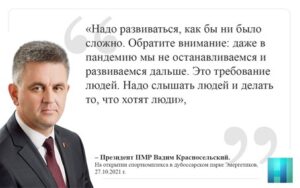
Image: TMR President Krasnoselskiy is willing to listen to people and do what the people expect him to do (Source: Novosti Pridnestroviya)
This year’s election
The 2021 presidential elections may have a higher turn-out than the “Corona election” of 2020. Despite the pandemic still being an issue in Transnistria, state regulation and social fear of the virus have subsided considerably. Nevertheless, with only two candidates on the ballot, the election won’t motivate the masses. Perhaps it’s good that the de facto government did away with the minimum turnout threshold in 2018. Here are the candidates for this year’s election, and those who didn’t make the cut:
Vadim Krasnoselskiy: current president of the TMR, officially independent but supported by the Obnovlenie Party. Krasnoselskiy has been officially registered since late October and is expected to win.
Sergei Pynzar: the only candidate running against the incumbent president. He is currently an independent deputy in the Grigoriopol district council, owner of the construction company “Seim”. He was registered as a candidate on the 19th of November after surpassing the required minimum number of signatures, 2% of all voters from his electoral district.
Anatoliy Dirun: former Obnovlenie member of the Supreme Council, current head of the Tiraspol School of Political Research. Dirun ran into issues last year when the Central Election Committee (CEC) didn’t allow him to run for parliamentary elections, and this year the CEC cited too many faulty signatures as the reason behind denying his bid to run (nearly 35% of his signatures were considered invalid by the CEC. For comparison 15% of Pynzar’s signatures were declared invalid, and 4% of Krasnoselskiy’s. Information here). The denial of the independent candidate Dirun was made known on the 12th of November.
Nikolai Malyshev: the only challenger not nominated by himself, but rather put forward by the voters in his district. Malyshev’s biography is political: he has previously worked as a committee head for economic analysis and forecasting in the Supreme Council, has also worked at the Transnistrian Republican Bank, and ran independently for a seat in parliament in last year’s elections. His application was denied, the CEC cited failure to properly provide all necessary documents, as listed in the Transnistrian electoral code, as well as signature abnormalities (27% considered invalid).
Sergei Dechev: the only other candidate besides Pynzar not from Tiraspol, he was to be registered in Bender. Before the independent candidate’s documents completed their 10-day reviewal period after pre-registration, he surprisingly withdrew the bid for the presidency himself. The CEC gave no official information as to why.
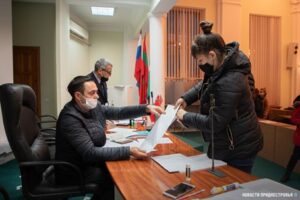
Image: The second day of “early vote” for the TMR presidential elections (Source: Novosti Pridnestroviya)
Afterthoughts
Looking at how the regular elections function in Transnistria can provide important clues as to the political direction in the country: the candidates that run, the parties in the parliament, voter turnout, the amount of unrivaled districts, and claims of voter fraud. Moreover, tendencies in Transnistria can also be looked at in a broader light: is Transnistria following anti-democratic tendencies in Russia? Or perhaps the global wave of authoritarianism is on trend in the office of the president? And what does this democratic slide in Transnistria say about de facto states?
Although the de facto state is obviously influenced by Russian foreign and domestic policy, it seems unlikely that Putin needs to actively support an authoritarian agenda in Transnistria considering the regions internal policies have hardly caused any headaches for the Kremlin in the past years. Furthermore, shifts around the globe away from open democracy may help Sheriff avoid criticism for their actions, but it can’t explain the current events either. De facto state researchers, however, have written a lot about political regimes in de facto states. This research can both begin to explain why governance in Transnistria is changing and, vice versa, Transnistria can provide insight into de facto state research.
At one point in time, de facto state research was divided on the idea of democratic legitimacy. The idea of democratic legitimacy and the debate over its presence was clearly described in Burak Bilgehan Özpek’s research. While the realist perspective in de facto state research argues that de facto states can only gain recognition if their patron states (or other global powers) can use them as a part of their own assertive political agenda. Özpek points out that Pål Kolstø makes this argument specifically about Northern Cyprus, Taiwan, and Nagorno-Karabakh in his 2006 piece on the future of unrecognized states. On the other hand, Nina Casperson notes that in our post-Cold War world, democracy has become a norm for legitimacy, and that there are an array of democratic benchmarks a de facto state can achieve in order to gain legitimacy – this is what Özpek classifies as the liberal perspective. Kosovo is seen as a role model for the liberal perspective: improve democratic institutions and enshrine liberal values into the government, recognition will follow.
The United States, along with many other states, seemed to provide the reward of recognition to Kosovo while referencing exactly those reasons. Furthermore, democracy and human rights are often cited as key factors in the American justification for its strong support for Taiwan. Nevertheless, the liberal approach clearly isn’t the quick fix some de facto states may hope it to be. Somaliland, as noted by Özpek, was a partly free country while its parent state Somalia wasn’t only not free but in complete disarray – nevertheless the country gained no recognition from major geopolitical actors. Nagorno-Karabakh, ranked by Freedom House as ‘partly free’, beat both Armenia and Azerbaijan in the freedom report – this has resulted in small groups around the world to call the recognition of Artsakh, but still no meaningful recognition.
Based on these examples, implementing rigid democratic norms in Transnistria, undoubtedly risky business for the political arm of the country’s monopoly, is not worth the risk. Furthermore, US recognition of Kosovo and strong cooperation with Taiwan can also just as easily be understood from the realist perspective. The idea, therefore, that Transnistria should somehow compete with Moldova to ‘out-democratize’ them in the name of recognition is ludicrous, and the politicians in Tiraspol have caught on. Democratic legitimation is being strangled by Sheriff, and the election in Transnistria, both in 2020 and upcoming this week, are proof of that. Both as an idea in de facto states research for theoretically solving the issue of non-recognition and as a policy suggestion from Western states for de facto regimes, democratic legitimation is no longer viable. Sheriff can share its power with a few select politicians and thrive in its current setting – without any recognition and without any real effort to improve democratic and liberal freedoms within their de facto borders.
Perhaps unknowingly, Tiraspol has taken on the realist perspective: if the recognition of Transnistria is in line with Russian, Chinese, American, or even Moldovan national interests, it will happen, and other states may follow. Importantly, it will happen because of the other country’s shifted national interests, and not because of domestic change in Transnistria. The doubts of that happening are serious, in the meantime Sheriff can, and will, maintain full control of the economy and of politics in Transnistria. In the likeliest of cases, the election on Sunday will give way to a continuation of monopoly rule in Transnistria and to the ultimate expiration of democratic legitimacy for de facto states.
Author: Lance Bradley


